Micronutrients
Source : BNP Paribas validated by the Rouen University Hospital
Summary
- Micronutrients
- Minerals and trace elements
- Micronutrients and health
- Conclusion
Food is an essential component of life, it provides the energy (macronutrients) and micronutrients needed for the body to function properly. This article aims to introduce you to the world of micronutrients.

Micronutrients
Unlike macronutrients, micronutrients do not provide energy, but they are also
essential for the development and proper functioning of the body. The majority of
the micronutrients cannot be produced by the body , thus it is important to supply them to the body through the diet. Micronutrients have the characteristic of being active at very low doses (mg/μg) and include vitamins, minerals and trace elements.
Micronutrients perform a variety of functions, including regulating various biochemical reactions (e.g. energy production, muscles and bone health), modulating the immune system and acting as antioxidants.
Dietary Reference Intakes (DRIs) are reference values that are quantitative estimates of
daily nutrients needs for healthy people to prevent the onset of a deficiency*. These requirements are represented by:

- Recommended Dietary Allowance (RDA) : Average daily level of intake sufficient to meet the nutrient requirements of nearly all (97–98%) healthy individuals.
- Adequate Intake (AI) : defined as the average intake of a population with no deficiency for the nutrient studied (Adequate nutritional status).
Vitamins
Vitamins are compounds that has an essential role in helping the body work properly. It is important to note that vitamins
cannot be synthesized by our body, with the exception of vitamins K and D. They must therefore be provided by a balanced and varied diet.

Vitamins can be divided into two categories:

Daily vitamin requirements may vary according to age, sex and the person’s situation
(pregnancy, breast-feeding, kidney disease, etc.). Here are few examples of vitamins, their
Recommended Dietary Allowance (RDA) or Adequate Intake (AI) , and some symptoms experienced in the event of a deficiency:
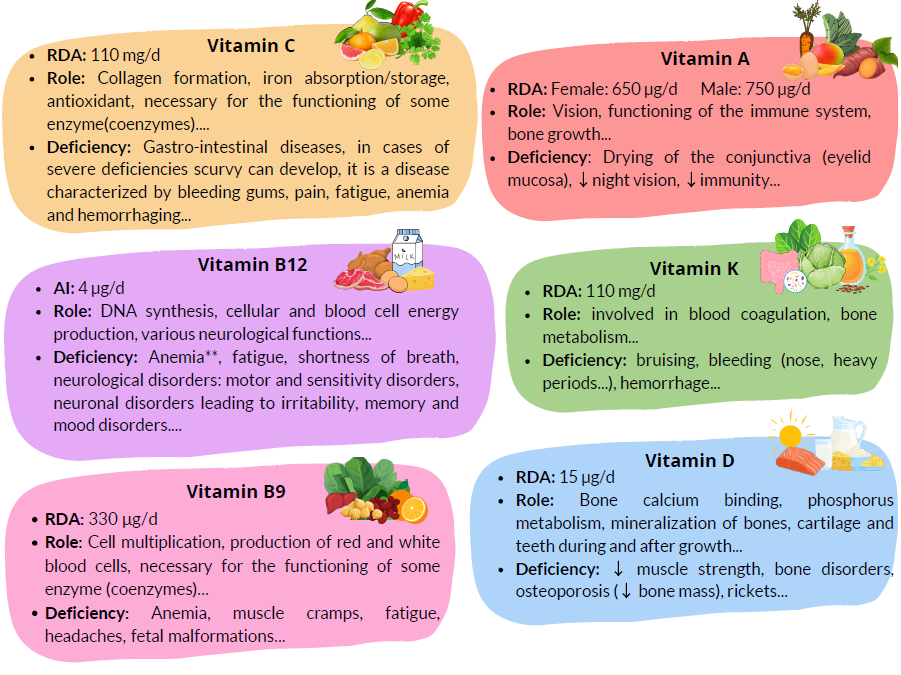
Minerals and trace elements
Minerals are essential for the body to perform vital functions. They cannot be synthetized by the body, which is why it is important to satisfy the body’s needs by eating a variety of food, and by drinking water (mineral, spring or tap). Trace elements are minerals present in small quantities in the body.
Here are the RDA/AI for adults for some minerals/trace elements:
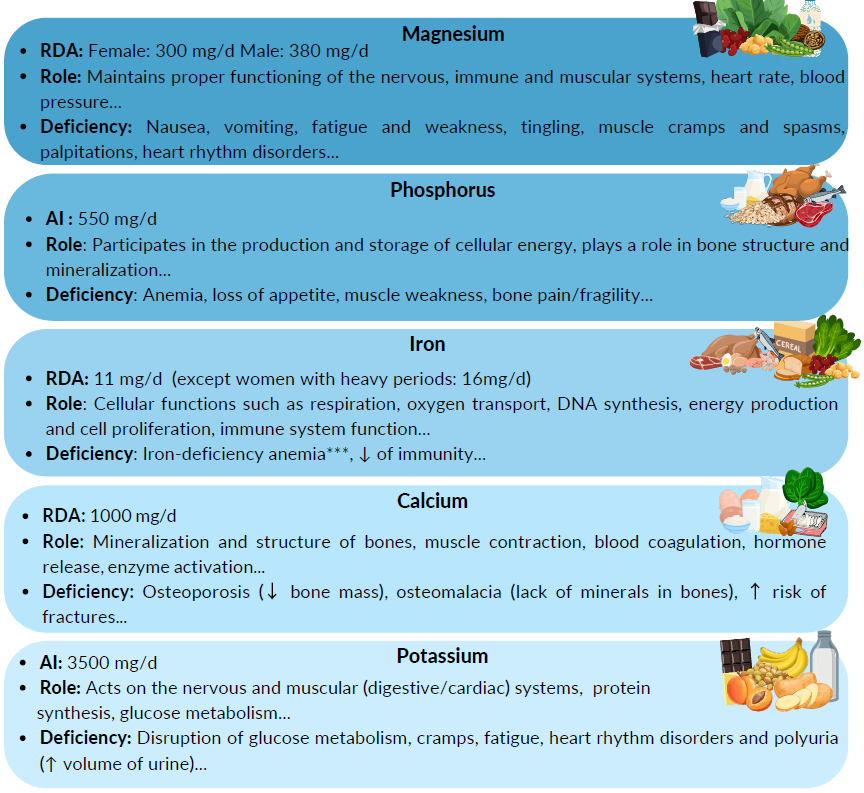
Micronutrients and health
As already mentioned, micronutrients are essential to the body’s proper functioning and can help maintaining a good health, due to their antioxidant activity and their interaction with the intestinal microbiota.
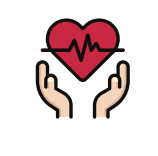
Antioxidant activity
Certain vitamins such as A, C, E and K, and minerals such as iron, zinc and selenium, are known as antioxidants, molecules that limit the production of free radicals. The body produces free radicals, unstable molecules which, when present in excessive quantities, promote ageing and the onset of various pathologies. Several environmental factors (pollution, tobacco, alcohol, radicals, UV rays, etc.) can increase the production of free radicals.
By limiting the production of free radicals, antioxidants can help the body limit its inflammation and could reduce the risk of the onset of various pathologies such as arthritis, diabetes, cancer and cardiovascular diseases.
Gut microbiota and micronutrients
The intestinal microbiota may play a role in the production and utilization of certain micronutrients. In fact, certain bacteria present in the intestinal microbiota contribute to the production of certain vitamins, such as vitamin K and most of the B vitamins. The microbiota can also promote the absorption of certain minerals such as iron and calcium.
In addition to that, the absorption of micronutrients can also modify the intestinal microbiota and thus inflammation. However, the causal link between intestinal microbiota and micronutrients (deficiency or excess) remain to be clarified.
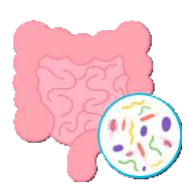
Dietary supplements
Dietary supplements are a concentrated source of nutrients used to supplement a normal diet. They come in many forms, including tablets, capsules, soft gels, gel caps, and liquids. In the absence of a pathology or special needs, a varied and balanced diet provides micronutrients in sufficient quantities for the proper development and maintenance of the body’s health. However, under certain conditions, such as when taking medication or when elderly, dietary supplements may be prescribed.

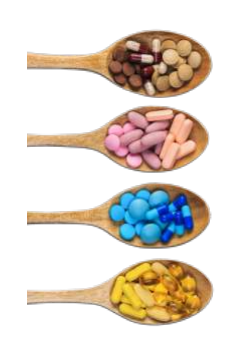
Although available without prescription, it is essential to consult a healthcare professional for appropriate advice when taking dietary supplements. Without proper advice, taking those supplements can have toxic effects on the body. Infact, an excessive consumption of vitamins and minerals can lead to toxicity , which can cause symptoms like: loss of appetite, nausea, vomiting, diarrhea, insomnia, fatigue, muscle pain…
The advice of a doctor is also recommended when taking food supplements, because some micronutrients can interact with each other and with certain drugs, altering their efficacy (e.g. calcium can limit the absorption of iron).
Conclusion
Micronutrients are therefore essential to the development and proper functioning of our organism. Their antioxidant
activity and their interaction with the intestinal microbiota contribute to their beneficial effect on our health. Most vitamins and minerals deficiencies can be avoided through a balanced and varied diet. However, under certain conditions, such as when taking medication or when elderly, dietary supplements may beprescribed and recommended.
It is essential to consult a healthcare professional for appropriate advice when taking dietary supplements to avoid toxicity, as well as interactions between different micronutrients and medications.
-
Micronutrients
pdf – 10 MB
 You might be interested in these articles
You might be interested in these articles